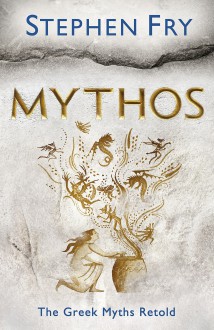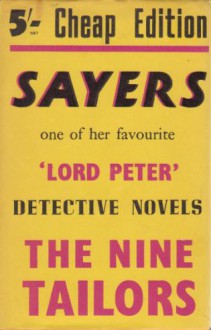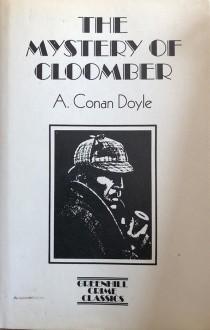Moonlight Reader's call for additional books gave me the excuse I needed to put together a mystery supplement to my original Essential Books list - and not feel guilty about it.
While my original list included some mysteries, I held back in favour of variety across genres and subjects. Note to Moonlight Reader and Themis-Athena: To make this list all-inclusive for mysteries, I'm repeating the ones I put in the original list, but I've marked them as repeats.
Repeated titles from original list:
Arthur Conan Doyle - There is nobody I'd recommend before I'd recommend Doyle. His writing remains to this day, wry, entertaining and easy to read; his settings are vivid, his characters written so well as to be almost holographic, and the plotting tight, intricate and the pinnacle of both inductive and deductive reasoning. Add to all of that the fact that the only person on Earth who bested Sherlock Holmes was a woman, and you have perfection.
Dorothy L. Sayers - All her work is worth reading; she was a genius with prose and plotting and while it might be almost blasphemous to say, might be Christie's superior when looking at the consistent excellence of her overall body of work.
File on Fenton & Farr - For mystery lovers, this is the natural extension, and apex, of the fair play mystery. Truly just a bound collection of witness statements, police reports and evidence; everything the reader needs to solve the mystery with no extraneous prose, and the solution at the back.
The Circular Study - I could have chosen several Anna Katherine Green novels that could qualified for this list; at least one of which is arguably a better story than this one, but I went with The Circular Study because it's ahead of its time in terms of plot devices. Published in 1900 by one of the first female mystery authors, the story used devices that are common in many mystery stories today, but were technologically non-existent in Green's time, lending the narrative an almost sci-fi feel at times.
The Circular Staircase - This story pioneered the 'had I but known' style of mystery writing. Rinehart is another female frontrunner of the mystery genre, preceding Christie and Sayers by at about 2 decades, and her writing remains gripping, action packed, and humorous today.
The rest of the list (in no particular order):
Strong Poison by Dorothy Sayers: This title deserves I specific mention, in my opinion. I know Gaudy Night is considered her strongest (with just reason), but for me Strong Poison affected me the most. It's probably the most emotional of the Whimsey books, with Harriet's startling apathy borne of complete hopelessness, and Whimsey's passionate – almost unreasonable in the face of the evidence – determination to save her. By the end I was thoroughly wrung out.
The Red House Mystery by A. A. Milne: While the world is definitely better for having Winnie the Pooh in it, Milne had untapped talent for imaginative and engaging mysteries, save for this one gem. It's not perfect, but which mystery writer ever wrote a perfect first novel? The potential though, is clearly there, and I think it's worth any reader's time who is interested in the Golden Age, and the history of the mystery genre.
The Mayor's Wife by Anna Katherine Green: Not only is the book very well written, but it has a little bit of everything fun and suspenseful in a vintage mystery: tales of hauntings, cryptic codes, unexplainable occurrences, dodgy butlers, and crazy old ladies staring out of attic windows. And Green was doing it all over 100 years ago.
3 Thirds of a Ghost by Timothy Fuller: Definitely one of the more obscure titles on my list, but for the hard core Golden Agers, I think it's worth the effort. Fuller authored several Jupiter Jones mysteries, and this one was fun, well written, has a large satirical streak, is self-referential, and openly pokes at popular tropes contemporary to its publication.
The Moving Toyshop by Edmund Crispin: Crazy, madcap fun, centered in Oxford. It might be stetching the definition a bit, but this mystery centers on a kind of gaslighting, and well, it's just a hoot.
The White Cottage Mystery by Margery Allingham: This is the only Allingham I've read, so she might have better, but I thought, for such a slim volume, she'd written an exceptionally good mystery here. The ending is daring, even by today's standards, and it just left me feeling as though reading it was time well spent.
The Mad Hatter Mystery by John Dickson Carr: The newest addition to my list, as I just finished it yesterday. Like Allingham, this is the only Carr I've read so far, but it is exceptional. Otto Penzler counts it as one of Carr's masterpieces and I have no trouble believing it. An essential read for any mystery lover.
Woman in White by Wilkie Collins: I'm going rogue here and choosing this over The Moonstone. Both are excellent; classics even, and well worth reading at least once (Collins can be rather verbose), but Woman in White has stuck with me as a more compelling mystery, while The Moonstone has largely faded from my memory.
The Murders in the Rue Morgue: The Dupin Tales by Edgar Allen Poe: Poe generally gets credit for writing the first detective mystery, and as such, mystery fans should definitely read this short story of a locked room mystery (of sorts). Dupin's influence on the creation of Sherlock Holmes is impossible to miss, though I argue that Doyle surpassed his mentor. Personally I find Dupin to be an ego driven ass in love with the sound of his own voice, but The Murders in the Rue Morgue is a good mystery, and the least objectionable of the Dupin stories.
Locked Doors by Mary Roberts Rinehart: Short the story may be in pages, but long in suspense, and fast in pace. If you can find this story anywhere, I highly recommend it; I promise you, you'll never see that ending coming.
Contemporary Titles - I'm not sure these will stand the test of time, but they've all certainly stood up to re-reads. With the exception of Midnight... all are the first in a series; the first book might not be classic contenders, but I've found the series as a whole to have merit.
Midnight in the Garden of Good and Evil by John Berendt: I've never felt confident about whether this was a true crime story or not, but either way it's a gripping mystery with amazing characters and the Savannah backdrop is the best supporting character. Haunting, atmospheric and definitely a must-read.
Caught Dead in Philadelphia by Gillian Roberts: Written in the late 80's, before a romance with a police detective became tropetasically cliche, the Amanda Pepper series centers on a prep school teacher as reluctant amateur sleuth. It's well written and solidly plotted, without the often painful shallowness that today's commercial cozies have adopted.
Them Bones by Carolyn Haines: This is definitely a recommendation for the series over the specific title. The Sarah Booth Delaney books straddle the line between traditional and cozy; there's a ghost that pesters the MC to get married and pregnant (not necessarily in that order) so the family line doesn't die out, but there's also a lot of emotional depth centered on friendship as well as love that is often painful to read (in a good way). Essential might be a stretch, but these books left a mark on me, and gave me food for thought.
Murder With Peacocks by Donna Andrews: Arguably the 'cosiest" of the books on this list, the series is meant to be funny and light. And it is - there's a scene in this particular book that made me laugh until tears streamed down my face. But every one of them is well written and Andrews created, in my opinion, the very model of a modern major general in Meg Langslow. She's everything every woman should want to be when she grows up (blacksmithing is optional).
Death at the Chateau Bremont by M.L. Longworth: The closest I've found to a true traditional mystery in recent years; this series takes place in Aix en Provence. The mysteries are complex, as are the characters, and the setting is magnificent.
A Morbid Taste for Bones by Ellis Peters: Classic traditional mysteries that take place in medieval times and centers on a monk named Brother Cadfael. On the surface, this sounds dull (at least it did to me) but Peters monk came to monastic vows late, after living a colourful and eventful life fighting in the crusades. This is a series that will definitely stand the test of time and, I think, will become a classic.


 Log in with Facebook
Log in with Facebook 








